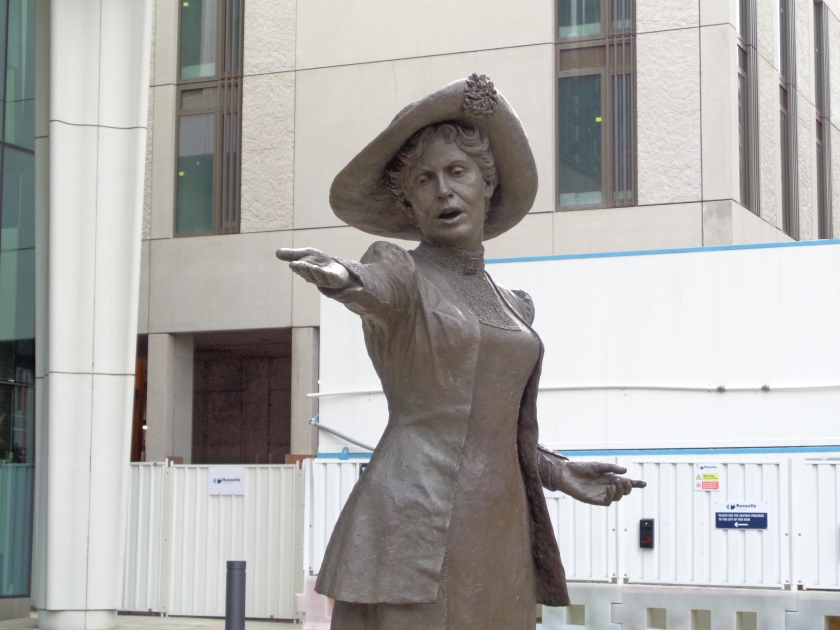
The female MC in ‘Happy When It Rains’ is my favourite of all the characters I’ve written. Emmeline ‘Emmy’ Montgomery is a feisty, lavender-haired body artist. Although when she first appeared in ‘Nobody’s Fantasy’ the 1st of the Ohana Girls novels (as Zev’s cousin), I didn’t think I’d ever write a book about her.
As discussed in a previous blog post (Manchester Monday: Chinatown) most of the inspiration for ‘Happy When It Rains’ came during my walk to the office every morning. After I’d passed the Chinese pagoda, I turned left and headed towards St Peter’s Square. There’s so much history in St Peter’s Square (it’s the site of the 1819 Peterloo Massacre) but this week I’m going to focus on the bronze sculpture of legendary British political activist, Emmeline Pankhurst (which is officially called Rise Up Women) by Hazel Reeves and its subject.
The more I thought about it, the more it made sense that even though she was born in Oahu, Hawaii, over 11,000 miles from Manchester, England, Emmy’s non-conformist parents would name her after the woman quoted as saying ‘I’d rather be a rebel than a slave.”
The sculpture was unveiled on 14 December 2018, a hundred years after the 1918 UK General Election. The 1918 election was the first to be held after the Representation of the People Act (1918) and therefore the first election in which women over the age of 30 could vote (previously all women had been excluded from voting). It was also the first parliamentary election following the Parliament (Qualification of Women) Act (1918) which allowed women to stand as candidates. There were 17 female candidates including Christabel Pankhurst (Emmeline’s daughter).
It’s also the first statue honouring a woman erected in Manchester since a statue of Queen Victoria was unveiled in 1901.
It’s an impressive statue and it inspired one of the funniest scenes in ‘Happy When It Rains’ but who was its subject, Emmeline Pankhurst?
- Emmeline Goulden was born in Moss Side, Manchester on 15 July 1858 although she believed that her actual birthday was a day earlier on Bastille Day (14 July). She felt a kinship with the female revolutionaries who stormed the Bastille and felt that being born on Bastille Day influenced the course of her life.
- She was one of 10 children and the eldest of 5 daughters.
- She began reading when she was very young – one source claims that she started as early as 3.
- When she met her future husband, Richard Pankhurst (a barrister who advocated women’s suffrage) she was 20 and he was 44. They married at St Luke’s Church, Pendleton on 18 December 1879.
- Emmeline and Richard had 5 children: Christabel (1880-1958), (Estelle) Sylvia (1882-1960), Francis Henry (1884-1888), Adela (1885-1961) and Henry Francis (1889-1910).
- In addition to establishing a fabric shop in London, in the 1890s Emmeline also wrote the ‘Temperance Home Circle’ advice column on home décor in the Manchester-based Alliance newspaper (Source).
- When Keir Hardie helped to create the Independent Labour Party (ILP), Emmeline applied to join. She was rejected by the local branch on the grounds of her sex but eventually joined the national party.
- During a visit to Switzerland in 1898, she received a telegram from Richard asking her to come home because he’d suffered a sudden relapse. It was too late and she found out that he’d died from reading a newspaper announcement while on a train from London to Manchester.
- After leaving the ILP, in 1903 she was one of the founders of the Women’s Social and Political Union (WSPU) open only to women and focused on direct action to secure the vote.
- Emmeline was arrested seven times before women’s suffrage was approved. The first was in 1908 when she attempted to enter Parliament to deliver a protest resolution to Prime Minister H.H Asquith. She was sentenced to six weeks in prison complaining of vermin, meagre food and the torture of solitary confinement.
- After harassment, the WSPU hired a jujitsu-trained female bodyguard to physically protect Emmeline from the police.
- In 1913, after the WSPU began using arson as a tactic, two of Emmeline’s daughters, Adela and Sylvia left the WSPU. Emmeline was so angry with Adela that she gave her £20, a ticket to Australia and a letter of introduction to a suffragette in Australia and insisted she emigrate there. The family rift was never healed.
- Emmeline and her favoured daughter, Christabel dissolved the WSPU in 1917 and created the Women’s Party. After the Parliament (Qualification of Women) Act (1918), Christabel stood as the Women’s Party candidate in the 1918 UK General Election in Smethwick, Staffordshire but was defeated by just under 800 votes by the Labour Party’s John Davison. The Women’s Party was wound up in 1919.
- In 1926 Emmeline joined the Conservative Party and in 1928 stood as their candidate in Whitechapel and St George’s. However her campaign was plagued by ill health and the scandal of her daughter, Sylvia having a child out of wedlock in December 1927.
- Emmeline died on 14 June 1928 and was interred in Brompton Cemetery in London. She died two weeks before the Representation of the People (Equal Franchise) Act (1928) extended the vote to all women over 21 on 2 July 1928.
Check back next Monday for another one of my Manchester highlights and if you want to find out what happens with Emmy and Daniel, you can pre-order ‘Happy When It Rains’ from Amazon (UK / US).

2 thoughts on “Manchester Monday – Emmeline Pankhurst”